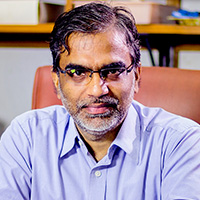
Thalappil Pradeep is an Institute Professor(*) at the Indian Institute of Technology Madras, Chennai, India. He is the Deepak Parekh Institute Chair Professor and is also a Professor of Chemistry. He studied at the University of Calicut, Indian Institute of Science, UC Berkeley and Purdue. His research interests are in molecular and nanoscale materials and he develops instrumentation for such studies. He is an author of over 500 scientific papers in journals and is an inventor of 125 patents or patent applications. In addition to the work on advanced materials, he is involved in the development of affordable technologies for drinking water purification and some of them have been commercialized. His pesticide removal technology is estimated to have reached about 10 million people. Along with his associates, he has incubated six companies and three of them have production units. His arsenic removal technology, approved for national implementation, is delivering arsenic free water to about one million people every day. He is a recipient of several awards including the Shanti Swaroop Bhatnagar Prize, BM Birla Science Prize, National Award for Nanoscience and Nanotechnology, India Nanotech Innovation Award, JC Bose National Fellowship and National Water Award. He is the winner of The World Academy of Sciences (TWAS) prize in Chemistry for the year 2018. The nation conferred Padma Shri on him in 2020. He is also the recipient of Nikkei Asia Prize 2020. He is a Fellow of Indian National Science Academy, Indian Academy of Sciences, National Academy of Sciences, India, Indian National Academy of Engineering, Royal Society of Chemistry, The World Academy of Sciences and American Association for the Advancement of Science. He is a distinguished professor in a few institutions in India and is also on the graduate faculty of Purdue University. He is the author of the introductory textbook, Nano: The Essentials (McGraw-Hill) and is one of the authors of the monograph, Nanofluids (Wiley-Interscience) and an advanced textbook, A Textbook of Nanoscience and Nanotechnology (McGraw-Hill). He is on the editorial boards of journals such as ACS Nano, Chemistry of Materials, Analytical Chemistry, Chemical Communications, Chemistry – An Asian Journal, Nanoscale, Nanoscale Horizons, Particle, Scientific Reports, International Journal of Water and Wastewater Treatment, etc., and is an associate editor of ACS Sustainable Chemistry & Engineering. He has authored popular science books in Malayalam, a regional language of India and is the recipient of Kerala Sahitya Academi Award for knowledge literature. In 2015, he received the Lifetime Achievement Research Award of IIT Madras. As part of his philanthropic activities, he supports a school in his village where 500 students are on rolls.